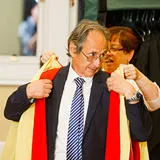
Michael Levitt
Nobel Prize in Chemistry 2013
Biography
Michael Levitt (Physics, 1967) is a biophysicist who was awarded the Nobel Prize for Chemistry in 2013.
Michael was born and grew up in Pretoria, South Africa. Bored at school, Michael decided to take his matriculation examinations two years early. With the help of a personal tutor, he managed to study for them over the summer vacation. At the age of 16 he entered Pretoria University to study Applied Maths.
A year into his university studies, Michael left to spend the break with his aunt and uncle in England, both of whom were successful chemists. Michael enjoyed his time in England so much that he decided to stay to pursue his studies. He took his A-levels before taking up a place to study Physics at King’s. He chose the university in part because of the biophysics work being done here by Maurice Wilkins, who had recently won the Nobel Prize.
Michael was already interested in the emerging use of computers in science. He spent the summer vacation of 1966 working at the Radiation Laboratory in Berkely, California, writing a programme using punched cards [perforated cards used to contain data in early computers].
In the year after graduating, Michael moved to Israel to work at the Weizmann Institute. Whilst there he met his wife Rina who moved with him to Cambridge in 1968 when he started his PhD. Michael spent much of his early career between Israel and the UK, using emerging computer technologies to model chemical structures and processes.
In 1987 Michael took up a Professorship at Stanford University. He started his own research group and began forging links with industry in order to develop his work.
Michael was elected to Fellowship of the Royal Society in 2000 and to the US National Academy of Sciences in 2001. In 2013, Michael was awarded the Nobel Prize for Chemistry alongside Martin Karplus and Arieh Warshel, for ‘the development of multiscale models for complex chemical systems’, laying the foundation for the computer models now used to understand and predict chemical processes. He was awarded an honorary doctorate by King’s the following year.
Did you know? Whilst completing his PhD in Cambridge, Michael built large models of molecules at home in an upstairs work room. With his first son Daniel on the way, he had to lower a space-filling, 60lb model of RNA [a molecule involved in protein synthesis within cells] out of the window.
Events

'Are scientists our new superheroes?' with Professor Michael Levitt
In an age of disinformation and disregard of expert opinion, did the COVID-19 pandemic bring us back around to place greater weight in the opinions and advice...
Please note: this event has passed.
Events

'Are scientists our new superheroes?' with Professor Michael Levitt
In an age of disinformation and disregard of expert opinion, did the COVID-19 pandemic bring us back around to place greater weight in the opinions and advice...
Please note: this event has passed.
